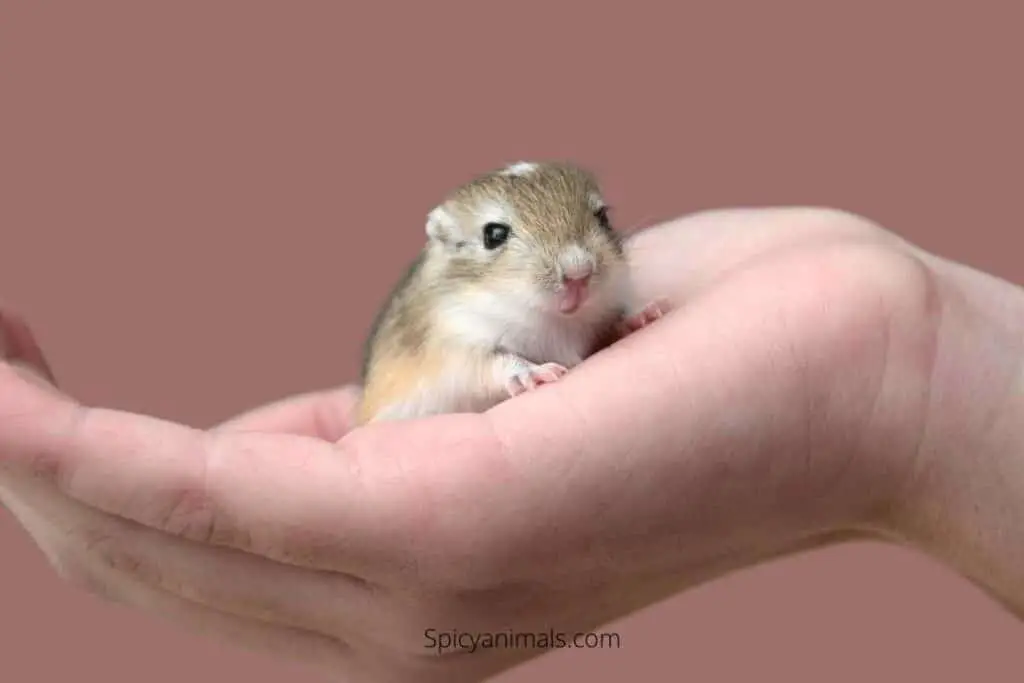When you have gerbils getting little pups, you might be wondering if there are things you have to take care of and how the development phase is for a newborn gerbil.
Baby gerbils are born blind and hairless. They are also very delicate, so it is important to handle them carefully. The mother will take care of them for the first few weeks, Giving them milk and keeping them warm.
The best thing you can do is to make sure the room they are living in is kept warm. Focus on the well-being of the mom and the mother will focus on the well-being of the pups. See if there is enough water and food for the mother, and make sure she is comfortable.
Table of Contents
What Baby Gerbils Need in Their Cage
Baby gerbils need mainly their mother and some nice soft bedding in their cage. The mother will help keep the babies warm and also help them learn to groom themselves and explore their surroundings.
The bedding should be soft so the babies can burrow and nest. It should also be absorbent to help keep the cage clean and dry. If you are using a commercial gerbil cage, you may need to add more bedding to make sure the babies have enough soft material to nest in.
You can also line the bottom of the cage with a layer of cardboard or paper towel to help absorb urine and protect the babies’ feet.

When Do Baby Gerbils Get Fur?
When gerbils are born, they are about the size of a jellybean. They are born with their eyes closed and without any fur. For the first week of their lives, they are completely dependent on their mother for food and warmth.
Around the 2-week mark, they start to grow their first fur. As they continue to grow, they will develop a more adult coat of fur. The color of their fur will depend on the specific species of a gerbil.
When Can I Touch a Baby Gerbil?
When gerbils emerge from their nest and start to gain fur after about two weeks, they are starting to become more mature and their immune system is developing.
Even though their bodies are stronger at this point, they are still delicate and require careful handling.
You should avoid rough or aggressive handling, and it is important to be very gentle when picking up or holding a baby gerbil.
You should always wash your hands before touching them in order to minimize the risk of introducing any harmful bacteria or illnesses.
How To Hold A Baby Gerbil?
When handling baby gerbils, it is essential to be gentle and calm. This will help them to feel safe and secure, allowing them to explore their new environment without fear.
Ideally, you should cup your hands gently around the baby gerbils and let them crawl on your lap or chest if you are lying down. If you are sitting upright, try placing the gerbils on a soft surface such as a towel or cardigan.
While it may take some time for the babies to get used to you and your touch, with patience and care they will quickly learn that they can depend on you for comfort and safety. As a result, raising gerbils will be an enriching experience for both you and the little ones.
What If My Baby Gerbil Gets Sick?
When it comes to your baby gerbil, you may often find yourself worrying about its health and well-being.
Whether your gerbil’s been sneezing a lot or appears to be lethargic, it’s always important to keep an eye out for signs of sickness and take the appropriate steps to care for your furry friend.
One of the first things you can do if you think your baby gerbil is sick is to consult with a veterinarian.
Your vet will be able to perform a thorough examination, conduct tests if necessary, and recommend treatments depending on the specific condition. Some common illnesses that affect gerbils include respiratory infections, gas blockages, overgrown teeth, and more.
In addition to seeking treatment from a professional veterinarian, there are some things you can do at home in order to provide your baby gerbil with extra comfort and care.
For instance, make sure that its cage is kept clean and dry, and monitor any changes in behavior or routine that could indicate a problem.
By being proactive with your baby gerbil’s health and taking action when needed, you can help ensure that it remains happy and healthy for years to come.
How Old Are Baby Gerbils when Their Eyes Open?
During the first few weeks of their lives, baby gerbils are completely dependent on their mother for survival. They rely on her for warmth, nutrition, and protection from predators.
However, around week 3, these little pups start to develop more independence. This is when they begin to open their eyes, though they won’t have fully developed vision at this point.
Their sensory capabilities will continue to progress over the next couple of weeks as they grow bigger and become more active. As they grow and explore their surroundings, it’s important for caregivers to keep a close eye on these young animals to ensure that they stay safe and healthy.
Through proper care and attention, we can help guide our gerbils as they take this important early step towards becoming independent individuals.
When Can Baby Gerbils Leave Their Mother?
By week five, baby gerbils are usually ready to leave their mother and explore the world on their own. This is an important milestone in their development, and it’s crucial that they have plenty of space to run and play.
Gerbils are social creatures, so they also need to interact with other gerbils in order to stay healthy and happy. If you’re thinking of adopting a gerbil, make sure you have enough room for multiple cages and that you’re prepared to handle a larger number of pets.
Baby gerbils are a lot of fun, but they’re also a big responsibility.
Do Baby Gerbils Squeak?
Baby gerbils squeak for a variety of reasons. For one, it’s a way to communicate with their mothers. When they’re born, they’re completely helpless, and their only way to get attention is to make noise.
Baby gerbils also squeak when they’re scared or excited. If you pick up a baby gerbil, it may squeak out of fear. Or, if you put your hand in its cage and it’s not used to being handled, it may squeak in excitement.
Whatever the reason, baby gerbils squeaking is perfectly normal behavior. If you have a pet gerbil, you’ll likely hear this adorable sound often.
Conclusion
The first weeks are crucial for the well-being of both the mother and her baby gerbils. It is important to focus on providing a comfortable environment for the mother so she can take care of her young.
After about five weeks, the baby gerbils will be ready to leave their mother and explore on their own. At this point, they’ll need plenty of space to run and play, as well as other gerbils to socialize with.
Baby gerbils are a lot of fun to watch, but they’re also a big responsibility.



